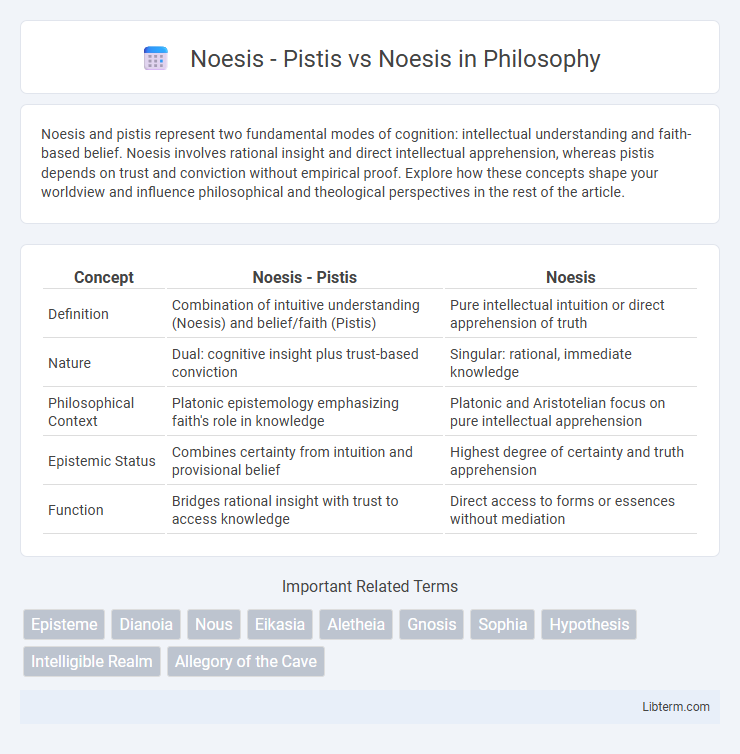Noesis and pistis represent two fundamental modes of cognition: intellectual understanding and faith-based belief. Noesis involves rational insight and direct intellectual apprehension, whereas pistis depends on trust and conviction without empirical proof. Explore how these concepts shape your worldview and influence philosophical and theological perspectives in the rest of the article.
Table of Comparison
| Concept | Noesis - Pistis | Noesis |
|---|---|---|
| Definition | Combination of intuitive understanding (Noesis) and belief/faith (Pistis) | Pure intellectual intuition or direct apprehension of truth |
| Nature | Dual: cognitive insight plus trust-based conviction | Singular: rational, immediate knowledge |
| Philosophical Context | Platonic epistemology emphasizing faith's role in knowledge | Platonic and Aristotelian focus on pure intellectual apprehension |
| Epistemic Status | Combines certainty from intuition and provisional belief | Highest degree of certainty and truth apprehension |
| Function | Bridges rational insight with trust to access knowledge | Direct access to forms or essences without mediation |
Understanding Noesis: Definition and Origins
Noesis refers to the act of pure intellectual apprehension or direct understanding, rooted in ancient Greek philosophy, particularly in the works of Plato and Aristotle. It denotes the faculty of the mind engaged in intuitive insight, distinct from pistis, which involves belief or faith without direct evidence. Understanding noesis involves recognizing its role as the highest form of knowledge obtained through rational contemplation or immediate intellectual intuition.
Pistis Explained: From Belief to Faith
Pistis, rooted in ancient Greek philosophy, transitions from simple belief to profound faith, distinguishing it from Noesis, which signifies intellectual understanding or direct knowledge. Unlike Noesis that involves rational cognition and insight, Pistis encompasses trust, conviction, and commitment beyond mere evidence. This shift from Pistis as belief to faith highlights its role in shaping personal and communal spiritual experiences.
Philosophical Roots: Noesis and Pistis in Ancient Thought
Noesis and Pistis originate from Ancient Greek philosophy, where Noesis represents intellectual cognition or direct apprehension of truth, especially in the works of Plato and Aristotle. Pistis, contrastingly, denotes belief or trust based on persuasion and empirical evidence rather than pure reason. The distinction between Noesis as rational insight and Pistis as faith underpins foundational debates in epistemology concerning knowledge acquisition and the nature of certainty.
Comparative Analysis: Contrasting Noesis and Pistis
Noesis represents the intellectual faculty of direct understanding or intuitive insight, while Pistis denotes faith as a form of trust or belief without full rational proof. Noesis relies on immediate cognitive apprehension of truth, whereas Pistis depends on acceptance despite incomplete evidence. This contrast highlights the epistemological divide between reasoned knowledge and faith-based conviction within philosophical discourse.
Noesis in Platonic Philosophy
Noesis in Platonic philosophy represents the highest form of intellectual cognition, characterized by direct, intuitive knowledge of the Forms or Ideas, transcending sensory experience and discursive reasoning. It contrasts with Pistis, which denotes belief or opinion based on empirical evidence and sensory perception, lacking the certainty and clarity of true knowledge. Noesis is central to Plato's theory of knowledge and reality, emphasizing the soul's capacity to apprehend eternal truths through rational insight.
Pistis in Religious and Philosophical Contexts
Pistis, rooted in ancient Greek philosophy and early Christian theology, signifies faith, trust, and belief as foundational to spiritual knowledge and ethical commitment. Unlike noesis, which denotes intellectual understanding or direct cognitive apprehension of truth, pistis embodies a relational and existential confidence in divine revelation or moral principles beyond empirical proof. This distinction underscores pistis as essential for religious experience and the cultivation of virtues, positioning it as a bridge between human reason and transcendent realities in philosophical discourse.
Cognitive Processes: How Noesis Differs from Pistis
Noesis involves direct, intuitive cognition or intellectual insight that transcends sensory experience, contrasting with pistis, which relies on belief grounded in external evidence or testimony. Cognitive processes in noesis emphasize unconscious intellect and immediate understanding, whereas pistis operates through rational acceptance and trust in empirical or communicated data. This distinction highlights noesis as an active, self-evident knowing process, while pistis remains dependent on external validation and probabilistic reasoning.
The Role of Intuition and Rationality
Noesis in Pistis emphasizes the interplay between intuition and rationality, where intuition serves as an immediate, non-discursive insight into truth, complementing rational analysis. Rationality systematically organizes knowledge through logical reasoning, but intuition provides the foundational, often subconscious grasp of meaning that precedes rational thought. This dynamic interaction highlights that optimal cognition arises when intuitive understanding informs rational deliberation, enriching the depth and accuracy of knowledge acquisition.
Practical Implications: Applying Noesis vs Pistis
Noesis emphasizes intellectual intuition and direct cognitive insight, enabling precise decision-making and problem-solving in complex situations. Pistis relies on faith-based conviction and trust, fostering resilience and motivation despite uncertain outcomes. Applying Noesis improves analytical clarity and innovation, while Pistis enhances emotional commitment and perseverance in practical endeavors.
Modern Interpretations and Relevance
Modern interpretations of Noesis and Pistis emphasize their distinct cognitive roles, with Noesis representing direct intellectual insight and Pistis embodying faith-based understanding. Contemporary philosophers highlight Noesis as a crucial element in epistemology, reflecting rational comprehension, while Pistis remains significant in discussions on belief systems and existential meaning. Their relevance persists in dialogues on knowledge acquisition, blending empirical reasoning with trust in unverifiable truths.
Noesis - Pistis Infographic

 libterm.com
libterm.com